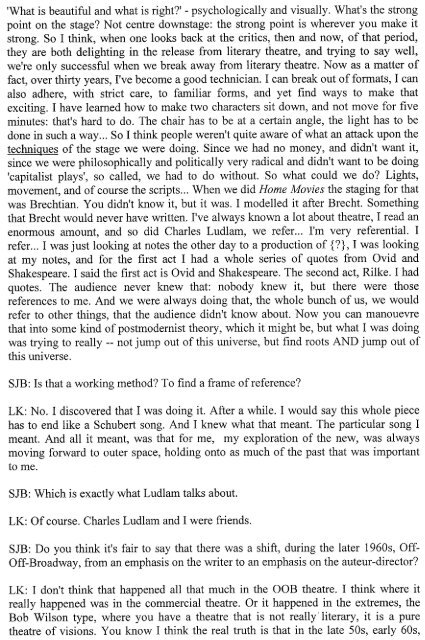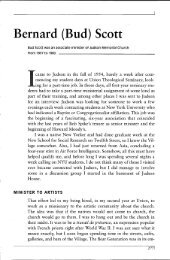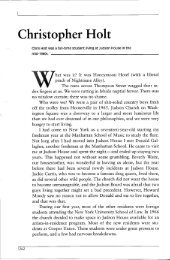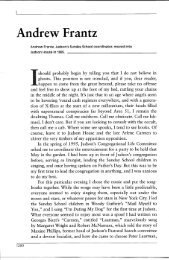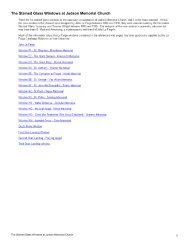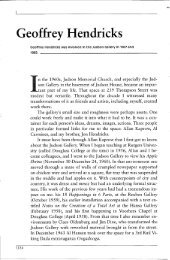LARRY KORNFELD INTERVIEW with Steve Bottoms, 9.95 - Judson ...
LARRY KORNFELD INTERVIEW with Steve Bottoms, 9.95 - Judson ...
LARRY KORNFELD INTERVIEW with Steve Bottoms, 9.95 - Judson ...
You also want an ePaper? Increase the reach of your titles
YUMPU automatically turns print PDFs into web optimized ePapers that Google loves.
'What is beautiful and what is right?' - psychologically and visually. What's the strongpoint on the stage? Not centre downstage: the strong point is wherever you make itstrong. So I think, when one looks back at the critics, then and now, of that period,they are both delighting in the release from literary theatre, and trying to say well,we're only successful when we break away from literary theatre. Now as a matter offact, over thirty years, I've become a good technician. I can break out of formats, I canalso adhere, <strong>with</strong> strict care, to familiar forms, and yet find ways to make thatexciting. I have learned how to make two characters sit down, and not move for fiveminutes: that's hard to do. The chair has to be at a certain angle, the light has to bedone in such a way ... So I think people weren't quite aware of what an attack upon thetechniques of the stage we were doing. Since we had no money, and didn't want it,since we were philosophically and politically very radical and didn't want to be doing'capitalist plays', so called, we had to do <strong>with</strong>out. So what could we do? Lights,movement, and of course the scripts ... When we did Home Movies the staging for thatwas Brechtian. You didn't know it, but it was. I modelled it after Brecht. Somethingthat Brecht would never have written. I've always known a lot about theatre, I read anenormous amount, and so did Charles Ludlam, we refer. .. I'm very referential. Irefer. .. I was just looking at notes the other day to a production of {?}, I was lookingat my notes, and for the first act I had a whole series of quotes from Ovid andShakespeare. I said the first act is Ovid and Shakespeare. The second act, Rilke. I hadquotes. The audience never knew that: nobody knew it, but there were thosereferences to me. And we were always doing that, the whole bunch of us, we wouldrefer to other things, that the audience didn't know about. Now you can manouevrethat into some kind of postmodernist theory, which it might be, but what I was doingwas trying to really -- not jump out of this universe, but find roots AND jump out ofthis universe.LK: No. I discovered that I was doing it. After a while. I would say this whole piecehas to end like a Schubert song. And I knew what that meant. The particular song Imeant. And all it meant, was that for me, my exploration of the new, was alwaysmoving forward to outer space, holding onto as much of the past that was importanttome.SJB: Do you think it's fair to say that there was a shift, during the later 1960s, Off-Off-Broadway, from an emphasis on the writer to an emphasis on the auteur-director?LK: I don't think that happened all that much in the GOB theatre. I think where itreally happened was in the commercial theatre. Or it happened in the extremes, theBob Wilson type, where you have a theatre that is not really' literary, it is a puretheatre of visions. You know I think the real truth is that in the late 50s, early 60s,


